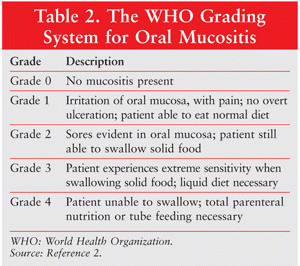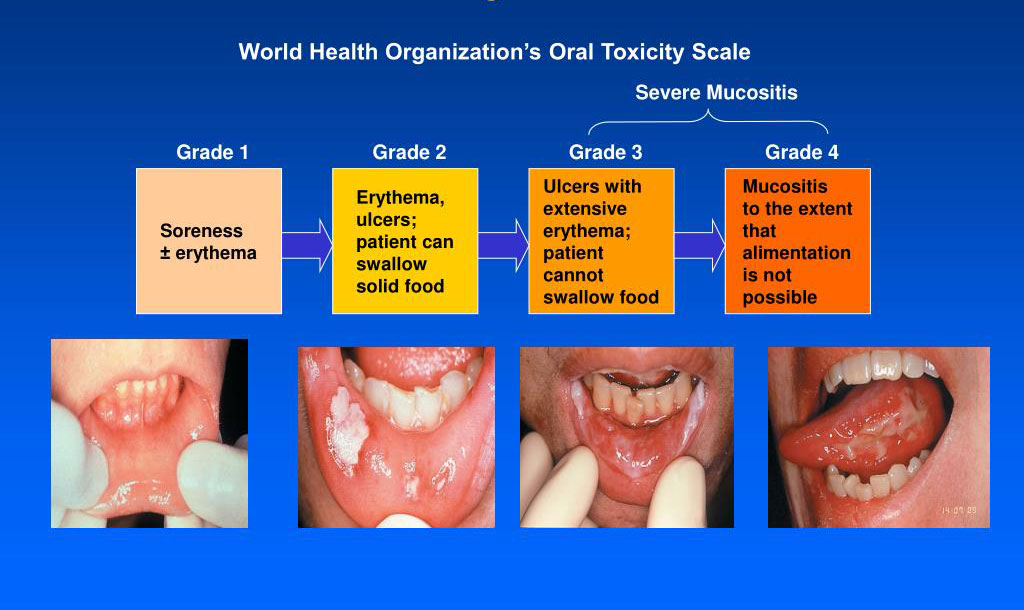Cancer Treatments, Mucositis & Mouthwash
Oral mucositis (inflammation of the mucosa lining of the mouth) and mouth of ulcers is a widespread and potentially serious consequence of high-dose chemotherapy and radiotherapy.
Symptoms, which may include altered taste perception, sores, and varying degrees of pain, usually appear 4 to 5 days after chemotherapy or radiotherapy treatment initiation.
A compounding pharmacist can formulate a specialised preparation such as a mouthwash to help manage the discomfort. There are various formulations that pharmacists can use based on the experience and needs of the individual physician and patient respectively.
Mucositis, painful inflammation and ulceration of the mucous membranes lining the digestive tract, can involve both the oral tract and the gastrointestinal tract. Oral mucositis is a widespread and potentially serious consequence of certain high-dose chemotherapy and radiotherapy treatments. It is a devastating consequence of cancer treatment for patients, who then find it extremely difficult to perform simple, everyday mouth-related activities, including chewing, biting, talking, swallowing, drinking, and sipping.
Oral and gastrointestinal mucositis affects up to 100% of patients undergoing high-dose chemotherapy and blood stem-cell transplantation and 80% of patients with malignancies of the head and neck who are receiving radiotherapy. Mucositis also affects a wide range of patients receiving chemotherapy.
Causes of Mucositis
About 5% to 15% of all patients undergoing cancer treatment experience mucositis. TABLE 2 details the grades of oral mucositis as defined by the World Health Organization (WHO). In grade 3 oral mucositis, the patient is unable to eat solid food; in grade 4, the patient is also unable to consume liquids. Radiotherapy to the head and neck or to the pelvis or abdomen is associated with grade 3 oral mucositis in more than 50% of patients. Among patients undergoing head and neck radiotherapy, pain and decreased oral function may persist long after the conclusion of therapy. HIV infection may cause oral thrush.

Oral mucositis is characterized by damage to the epithelial or lining cells mouth and throat. Epithelial cells normally serve as a barrier between the inside and outside of your body and protect it from viruses.
Because of their relatively high turnover rate compared with cells in other organs, epithelial cells are particularly susceptible to the damaging effects of radiation and chemotherapy. A reduction of the saliva barrier, disruption of epithelial cells, thinning of the epithelium, and ulceration also occur. Other conditions can contribute to oral mucositis, including oral infections and trauma or irritation.
Symptoms
Cancer patients who are undergoing chemotherapy usually develop symptoms of oral mucositis 4 to 5 days after treatment is initiated. A peak is reached at around day 10, followed by slow improvement over the course of a few weeks. Radiotherapy-induced mucositis, which usually appears at the end of the second week of treatment, may last for 6 to 8 weeks.
As a result of epithelial-cell death, the lining of the mouth thins sloughs off and becomes red, inflamed, and ulcerated. Ulcers range in size from 0.5 cm to greater than 4 cm. Oral mucositis can be extremely painful; the degree of pain, often described as a burning sensation, is usually related to the extent of the tissue damage. As a result of the pain, the patient may experience trouble speaking, eating, or even opening the mouth.
Alterations in taste perception are common, especially in patients receiving radiation therapy to the neck and mouth. An altered sense of taste is a temporary condition that occurs because of effects on the taste buds located mainly in the tongue. Common complaints are that food tastes too sweet or too bitter or continually has a metallic taste. In some cases, only partial recovery of taste occurs. Severe pain and the inability to chew, swallow, or talk may ultimately lead to dehydration and malnutrition. The lack of saliva can cause tooth caries, loss of fillings, mouth ulcers, and pain, as saliva has a cleansing effect on the mouth and controls bacteria.3
Pain and loss of taste perception make it more difficult to eat, which frequently leads to weight loss. Infection of the sores or ulcerations by a virus, bacterium, or fungus can occur. About half of all patients receiving chemotherapy develop severe oral mucositis that may require modification of the patient’s cancer treatment.
Treatment
For patients undergoing chemotherapy, radiotherapy or preventive strategies should be started before the cancer treatment. These include:
- a pretreatment dental examination
- good oral hygiene such as cleaning the mouth every 4 hours and at bedtime
- brushing the teeth with a gentle toothbrush two or three times daily and a non-detergent toothpaste,
- flossing between the teeth
- using an alcohol-free mouthwash.
If saliva dries up the patient could:
- use artificial saliva (ask your compounding pharmacist) or
- chew sugar-free gum
If the mucositis develops and is painful the patient could:
- Use a special mouthwash formulated by a compounding pharmacist depending on your specific symptoms that may include an anaesthetic, an antiseptic, an antifungal, a barrier protection agent, an anti-inflammatory or an anti-viral.
- Drink plenty of liquids – at least 3 litres per day
- Avoid alcohol
- Avoid citrus fruits, tomatoes, acidic foods, alcohol, and hot foods that can aggravate mucositis lesions.
- Eat food that is soft, non-spicy, pureed, or in liquid form. Harder foods should be treated to make them soft and easy to eat.
- Refrain from smoking.
- Suck ice cubes. This is a simple, but often effective, method
Compounded Preparations
Your compounding pharmacist can discuss the various ingredients that can be incorporated into a mouthwash depending upon the various symptoms being managed. In addition, they can flavour a custom mouthwash according to the patient’s individual preferences.
Alternatively, the medicines may be compounded into an ice-block, paste or lollipop and can be flavoured.

